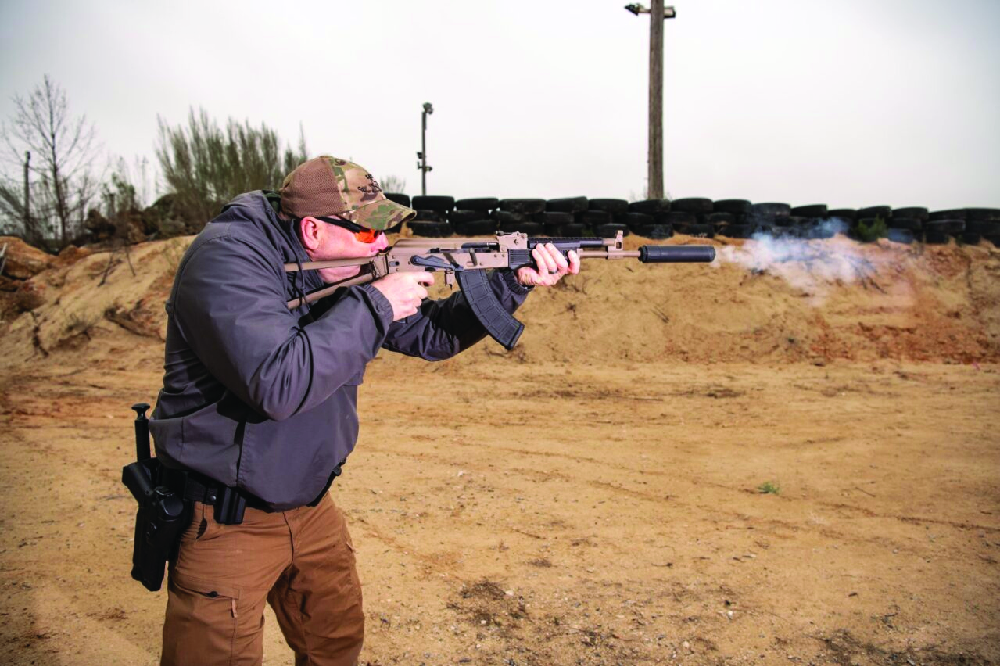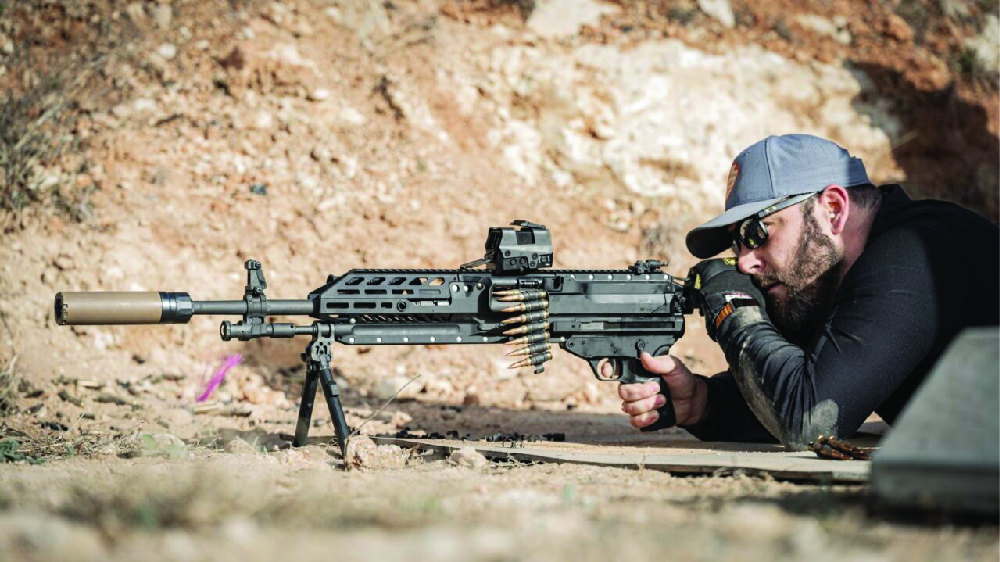Estimated Reading Time: 5 Minutes
- Blowback is the effect of excess gas in the operating system of a firearm.
- Blowback can lead to gas in your face, increased parts wear, and reliability issues.
- Silencers can increase or decrease this effect, depending on the design.
- Tuning your suppressed rifle can alleviate blowback issues.
Blowback refers to the excess gas caused by firing a bullet. This gas can get into your face and eyes and cause cycling issues with your firearm if there is too much blowback.
Suppressors can diminish or increase blowback depending on the firearm and suppressor design.
Low backpressure suppressors like the HUXWRX Flow 556k will decrease blowback, while traditional designs can increase blowback - without proper tuning.
Table of Contents
What is Blowback?
Firing a round of ammunition generates high-pressure combustion gasses. These gasses propel the projectile down the barrel.
Blowback refers to combustion gasses and, sometimes, debris that travels back into the firearm's action or toward the shooter rather than out the barrel's muzzle and into the atmosphere.
You might hear certain firearms are "gassy" or have bad blowback. This usually refers to the feeling of the combustion gasses exiting the ejection port (or rear of your weapon) and hitting you in the face.
The exiting gas can make your eyes water, is uncomfortable, and can impact your range days.


How do Silencers Affect Blowback?
Traditional firearm suppressors work by trapping extremely hot, high-pressure combustion gasses and allowing them to cool and slow down before exiting the muzzle and venting into the atmosphere.
While this reduces the sound signature of the firearm, it also traps pressurized gas in the barrel after the bullet is fired.
When the action opens on a semi-automatic firearm to eject the empty case, it creates a low resistance path for the pressurized gas to escape.
The trapped gas in your barrel then rushes towards you while the action opens. Thus, the suppressor blowback feeling.
Luckily, there are many ways to easily alleviate blowback, resulting in an ultra-quiet rifle without excess gas.
How to Deal With Blowback
Blowback can be effectively managed through strategic steps, especially when using suppressors.
When selecting a suppressor, it is essential to remember that not all silencers are equal. Some offer greater effectiveness at mitigating blowback.
The first and easiest option is to get a low-backpressure silencer.
Brands are developing suppressors specifically designed to reduce blowback. These include:
- HUXWRX
- SilencerCo
- Sig Sauer
- CGS
- B&T
- And others
The second way is to swap out a few parts to tune your rifle. Customizing your rifle for suppressors
will make the weapon run smoother and quieter without any gas in your face.
A few common accessories you can add to fine-tune your AR-15 or other similar weapon system are:
Adding a gas-defeating charging handle is another quick way to prevent unwanted gas from getting into your eyes.
What is the Effect of Blowback?
In a gas-operated firearm such as a standard AR-15, increased blowback from the addition of a suppressor can affect the timing and operation of the gun.
Typically, due to the system remaining under elevated gas pressure for a longer time, the action cycles faster than without the silencer.
Likewise, in some semi-automatic pistols, the action may cycle slightly faster.
In both cases, the shooter sometimes feels this increase in blowback as puffs or jets of fumes.
These puffs might seem like a minor irritant. But these gasses can include some tiny flecks of debris, which is not ideal.
Manual action firearms such as bolt-action rifles or lever actions rarely experience blowback since they are not gas-operated systems.
Even with the delay from the silencer, the gas pressure inside the barrel drops to ambient pressure levels quickly by the time the shooter opens the action.


Conclusion
Understanding suppressor blowback can vastly improve your suppressed shooting experience.
Some firearm and suppressor combinations can result in increased gas blowback toward the shooter. However, a few simple adjustments to your rifles or pistol will reduce, redirect, or mitigate blowback.
Additionally, an increasing number of silencers are designed to limit changes to back pressure and blowback.
Silencer Shop have you covered if you want to learn more about suppressors and related accessories.
We are committed to assisting both seasoned riflemen and newcomers in navigating the intricacies of firearms usage, including issues like suppressor blowback





